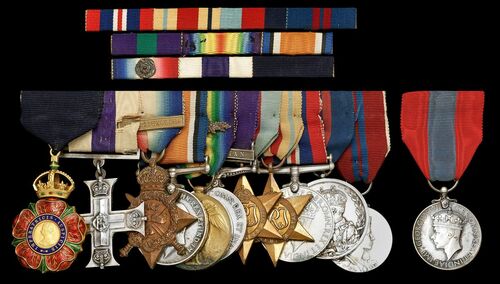
Auction: 23113 - Orders, Decorations and Medals - e-Auction
Lot: 562
The Mesopotamia 1919 C.I.E. and 1918 M.C. group of eleven awarded to Lieutenant-Colonel C. G. Lloyd, Supply and Transport Corps
A long-standing member of the East African community, he was a founder of the Karen Country Club in Nairobi
The Most Eminent Order of the Indian Empire, C.I.E., Companion’s breast Badge, gold and enamel; Military Cross, G.V.R.; 1914 Star, slide clasp (Capt. C. G. Lloyd. S. & T. C.); British War and Victory Medals, with M.I.D. oakleaves (Lt. Col. C. G. Lloyd.); General Service 1918-62, 1 clasp, Kurdistan (Major. C. G. Lloyd.); 1939-45 Star; Africa Star; War Medal 1939-45; Dehli Durbar 1911 (Lieut. C. G. Lloyd.); Coronation 1953, mounted as worn, minor pitting and contact wear to campaign awards, overall good very fine (11)
C.I.E. London Gazette 3 June 1919 (Mesopotamia).
M.C. London Gazette 26 August 1918 (Mesopotamia).
M.I.D. London Gazette 15 August 1917.
M.I.D. London Gazette 6 June 1919.
Charles Geoffrey Lloyd was born Llanfihangel, Wales, on 12 March 1884, the son the Biship John Lloyd of Swansea. Educated at Repton and later Cambridge he joined the 4th (Militia) Battalion, South Wales Borderers on 7 May 1904. Transferring to the Essex Regiment with the rank of 2nd Lieutenant on 3 September that same year he was still with them on the outbreak of the Great War in August 1914 and entered the war in France in October 1914, remaining until September 1915
Transferring to the Indian Army on 26 October 1915 with the rank of Captain Lloyd was to serve with the Supply and Transport Corps at Gallipoli until January 1916 and thence in Mesopotamia. Remaining here he was awarded the Military Cross with them in 1918 and was advanced Major on 1 August 1918. An article in the The Carmarthen Journal and South Wales Weekly Advertiser on 30 August 1918 also states that he served as 'O.C. Divisional Troops Transport in Mesopotamia. Last August he was mentioned as "deserving special mention". He also served as Temporary Lieutenant-Colonel for at least some time although returned to the rank of Major after the war.
Remaining in the east after the end of the war Lloyd served as Senior Supply Officer 18th Division, being in Iraq in 1919. As a result he was present for the Kurdish revolt that presaged the Iraq Revolt the next year. Lloyd's role as Supply Officer would doubtless have been a vital one as British forces attempted to garrison the country in the wake of the Great War.
Remaining a part of the British Army Lloyd appears to have served in India for much of his military career, being promoted Lieutenant-Colonel in 1930. Retiring with that rank in 1935 he settled in Kenya as a Farmer and occupied himself be being a Founder Member and Debenture Holder of the Karen Club upon its foundation in 1937. Returning to Service on the outbreak of the Second World War Lloyd served from 1940-41 in East Africa. He died at Nairobi, Kenya on 12 December 1953 and is buried in the Nairobi City Park Cemetery; sold together with copied research comprising census data, an extract from Kelly's Handbook 1950 and the The Carmarthen Journal and South Wales Weekly Advertiser as well as medal rolls, M.I.C. and London Gazette extracts along with an original Kurdish Dagger and a hatbox containing riband bars, badges and a Royal Artillery cap Badge engraved 'Pam from Roland' all within a metal travelling case named 'Lt. Col. C. G. Lloyd'.
Subject to 20% VAT on Buyer’s Premium. For more information please view Terms and Conditions for Buyers.
Sold for
£2,300
Starting price
£950




